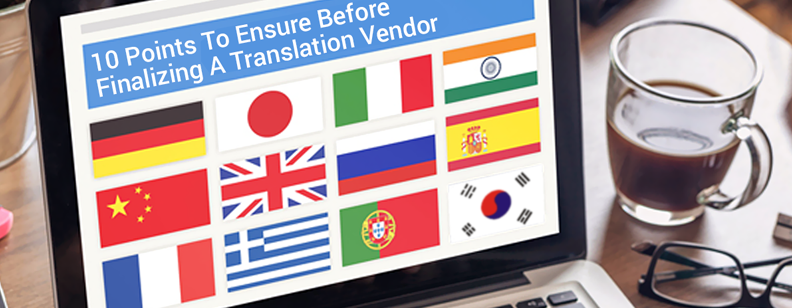We often hear the words “the world has shrunk into a global village”. True to some extent, globalization is not only the access achieved by the expansion into other countries. The decision to go global is easier to place on paper, but difficult to execute into actions.
Imagine you own a company providing documents for travel agencies across the world. For the translation of documents in, say, Chinese Mandarin, you hire a native translator who is adept at translation into Chinese. The travel document is translated efficiently and your customers are happy.
This is only a small part of the process. Now imagine you need translation of a lengthy travel catalogue in 12 languages. You can’t hire that many translators due to financial and time constraints.
How will you handle this situation?
Instead of hiring separate translators to do this job, you can hire a translation vendor for your projects. But before you take this step, you need to ensure the following points before finalizing a translation vendor:
1. Years of Expertise
Have you ever visited a hair salon and got skeptical when they claimed to be in hairdressing business for years?
The same is true for translation vendors. When choosing a translator vendor, it is important to make a background check of its experience. An experienced vendor will have a huge team of professionals and standard processes in place, with a “knowledge” repository that will ensure quick turnaround time for projects.
But be sure to watch out for those vendors who offer all kinds of services and claim to be experts in all of them.
To verify their expertise, as for references from other customers operating in the same industry and look for any services these vendors may have delivered in the past.
2. Financial Security
Forging a long term relationship with translation vendors requires a check on the financial stability of the vendor as well. Being financially secure implies that the translation vendor is profitable, has a good track record of paying its staff fairly and promptly, and is growing organization.
For checking this financial viability, a company can simply access the vendor’s profitability and growth figures for the past 3-5 years. This should be enough to give them an idea of the financial stability of the vendor.
3. Quality Certifications
It is said that quality should be the top most criteria for assessing the services of a company, particularly true for translation vendors. If you value quality, you should search for agencies with a sophisticated and efficient workflow management system.
Just look for vendors that have acquired the ISO 9001 and ISO 17100 certification for professional translation services and possess certifications by international Quality Assurance Standards.
Also Read: Choosing your Indonesian Translation vendor
4. Global Presence
When choosing a translation vendor, one should consider its office locations as well as global presence. This is important due to the need of the language. If you are looking to expand in Southeast Asia, partnering with a translation vendor that has project managers in Southeast Asia can help ensure that your translation needs are met seamlessly.
5. Round the clock Customer Service
A round the clock service is critical in translation owing to the difference in time zones which can negatively disrupt the communication process.
For instance, there is a 12-hour time difference between New York and Hong Kong and if a client in Hong Kong wants a project translated, he would not be able to receive that communication until late that evening. That is the reason it is so important to have a 24/7 customer support when it comes to choosing a vendor—it saves time.
6. Linguists and Translators Expertise
A linguist or translator is your point of contact when you are searching for a translation vendor to do the job for you. Not surprisingly, this contact person should be a highly talented and skilled project manager who can manage your websites, documents, software localization, and interface the expert way.
The criteria for choosing a project manager is simple—their expertise, education, and ability to direct a solution for your problem. The more languages your translation vendor could handle, the better it will be.
7. Glossary and Memory Tools
Each business or industry has its own set of terminologies and glossaries unique to its own. The key is to choose a translation vendor that is adept at creating and maintaining glossaries to cater to the needs of all businesses.
Take the litmus test of seeing whether the translation agency you wish to choose has a maintained library of glossaries and terminology as it displays the will to provide high customer value.
8. Data Security and Confidentiality
Confidentiality—the word that the social world of today revolve around. The confidentiality and security concerns are of such critical nature that companies seek those translation vendors who are a minimum ISO 9001 certified.
For companies that have even a higher security concern should seek out vendors that have ISO 27001 and above certification.
9. Memory Tools Knowledge
For a translation vendor, it is important to check whether they use translation memory tools such as SDL Trados or OmegaT etc.
These tools, if used efficiently, can be a great source of repository for completed projects as they can identify the repetitive content and produce a detailed report in terms of number of words.
10. Language Technology
Same as the vendor skills and expertise, most translation vendors have a language technology department that consists of localization engineers and specialists.
This is to ensure that your translation partner can provide you with the right set of technologies to streamline your workflows. Tools such as translation portals, customized machine translations, and system integrations are some of the technologies used by translation agencies.
The Last Word:
Although choosing a translation vendor may be tougher than it seems, the benefits of an expert translation agency are manifold. A good translation vendor would not only be your best partner in the journey to globalization, it would also give you the “leg-up” in your quest for taking your business on the global platform. That is why it is important to choose wisely before you choose globalization.







